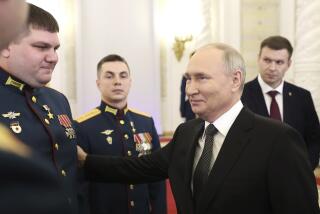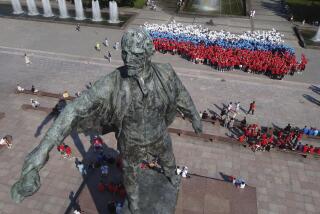Chernenko Has 6 Months to Live, U.S. Officials Say
- Share via
SANTA BARBARA — Soviet President Konstantin U. Chernenko is suffering from terminal emphysema but probably will live at least another six months, U.S. intelligence sources say.
Meanwhile, U.S. officials are picking up signals that the Soviet Politburo may be planning to dilute Chernenko’s authority, perhaps to the point of leaving him as a figurehead. The purpose would be to smooth the way for the ultimate transfer of power.
Such a siphoning away of power would be virtually unprecedented. Soviet leaders in the past have retained all their power until they died or, as in the case of Nikita S. Khrushchev, were ousted by the Communist Party’s ruling Politburo.
The 73-year-old Chernenko--the third man to head the Kremlin while President Reagan has occupied the Oval Office--completed his first year as Soviet leader Tuesday amid increasing uncertainty and speculation about the state of his health. He has been absent from public view for seven weeks, missing several events considered important to the Kremlin.
The Reagan Administration is operating under the assumption, it was learned, that Chernenko has acute emphysema, but--despite rumors that he is on the point of death--could live another six months or more.
U.S. officials expect to have a clearer picture of Chernenko’s physical condition next weekend when he should, according to custom, appear before his constituency as a nominee for election to the Supreme Soviet, the nation’s nominal Parliament which is made up of locally elected representatives.
The origin of the signals that the Politburo may strip Chernenko of much of his authority is the KGB, the Soviet secret police and intelligence agency, U.S. intelligence sources say. One theory is that the KGB may be promoting the speculation to generate support for a power shift. But, whatever the reality and motive, U.S. officials are treating the signals seriously.
Chief of State
Chernenko is president of the Supreme Soviet, or head of state; general secretary of the Communist Party’s powerful Secretariat, and the leading member of the party’s policy-making Politburo.
Speculation among U.S. officials has focused on the ailing Chernenko losing the key job of party general secretary, and perhaps with it his membership on the Secretariat altogether. The Secretariat, appointed by the Central Committee, runs the nationwide party bureaucracy. This would leave Chernenko as a figurehead president with relatively little actual power.
U.S. officials, admittedly puzzled about the private machinations of internal Soviet politics, are not sure which potential candidate to succeed Chernenko, if any, would benefit from a power shift while he is alive.
Speculation on who Chernenko’s successor will be has centered on two Politburo members, Mikhail S. Gorbachev, 53, and Grigory V. Romanov, 62. The relative ranking of Politburo members is never announced, and Western specialists on Soviet politics watch such things as who stands beside the leader when the Politburo gathers for public observances such as the annual May 1 parade in Red Square.
Bases of Support
However, Gorbachev is widely believed to be second only to Chernenko, and one theory held by some American officials is that he would benefit most from a power shift now because he would be likely to step up to become general secretary. However, another theory holds that Romanov would benefit because he is believed to have stronger backing among the military and the KGB, considered to be necessary bases of support for succession to the top of the Kremlin leadership.
But American officials doubt that any such shifts in Kremlin authority would significantly affect Soviet policy, especially in the next few months. Decision-making in Moscow also is expected to remain a slow process, just as it has been for the past year.
In particular, U.S.-Soviet arms talks scheduled to resume March 12 in Geneva are not expected to be significantly affected. The Soviets’ motivation for returning to the negotiation table, it is felt, will remain the same: They want to scuttle President Reagan’s “Star Wars” missile defense research program and halt the U.S. buildup in nuclear weapons, which is seen by Soviet military leaders as especially ominous because of American technological superiority.
Immunity From Pressure
Meanwhile, White House spokesman Larry Speakes--here with the vacationing President--stated for the record a growing anxiety within the Administration that has led to the “Star Wars” defense program: that the Soviet Union could become far superior to the United States in offensive nuclear weaponry during the next decade, largely because of its increasing ability to move and hide land-based intercontinental missiles and its immunity from internal political pressures.
“Conceivably in the 1990s you could be faced with a situation where you were not able to determine what the size of the Soviet forces were. And that would be a very difficult position to be put in,” Speakes told reporters.
More to Read
Sign up for Essential California
The most important California stories and recommendations in your inbox every morning.
You may occasionally receive promotional content from the Los Angeles Times.














